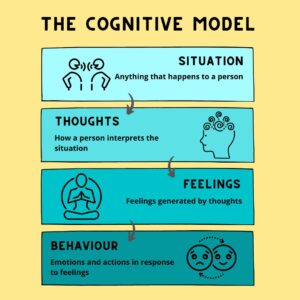At First City Counseling, we are committed to helping individuals find effective paths toward mental wellness. Cognitive Behavioral Therapy (CBT) is one of the most evidence-based approaches to mental health treatment, recognized worldwide for its success in treating a range of mental health conditions, from depression and anxiety to PTSD and eating disorders. One of the core components of CBT is cognitive restructuring—a technique that can have a profound impact on how we process, react to, and ultimately overcome negative thoughts and emotions.
What is Cognitive Behavioral Therapy (CBT)?
CBT is based on the idea that our thoughts, feelings, and behaviors are interconnected, and that changing one can influence the others. While life can bring challenges and pain, CBT helps individuals identify and reframe distorted thoughts and beliefs, equipping them with practical tools to navigate difficult emotions and situations more effectively.
The Role of Cognitive Restructuring in CBT
Cognitive restructuring is a foundational technique within CBT. It involves identifying and challenging negative or irrational thought patterns that can lead to emotional distress. Over time, these patterns can become deeply ingrained, making us more susceptible to anxiety, depression, and a host of other mental health challenges. Through cognitive restructuring, individuals learn to:
Identify Distorted Thinking – Recognize unhelpful thoughts that negatively impact their perception of themselves, others, or situations.
Challenge and Analyze Thoughts – Question the validity of these thoughts, considering alternative, more balanced perspectives.
Replace Negative Thoughts – Transform irrational or negative thoughts into more constructive and empowering ones.
How Cognitive Restructuring Works
Let’s take a closer look at the process of cognitive restructuring and how it can benefit someone’s mental health:
Identifying Negative Thoughts Often, we experience automatic thoughts that can be distorted or exaggerated without us even realizing it. For example, if someone struggles with self-esteem, they might frequently think, “I’m not good enough” or “I always fail.” Cognitive restructuring begins with becoming aware of these automatic thoughts, many of which fall into common cognitive distortions, such as catastrophizing, black-and-white thinking, or overgeneralizing.
Challenging Negative Thoughts Once negative thoughts are identified, the next step is to challenge them. For example, let’s say someone has a fear of public speaking and thinks, “If I make a mistake, everyone will judge me.” In cognitive restructuring, they would examine the evidence for and against this thought. Are there facts supporting the idea that one small mistake would lead to harsh judgment, or is this a projection of an internal fear?
Replacing Negative Thoughts with Balanced Thoughts Through cognitive restructuring, clients learn to replace irrational thoughts with more balanced, realistic ones. Instead of thinking, “I’ll never succeed,” they might learn to think, “I may face challenges, but I’ve overcome obstacles before and am capable of growth.” This shift helps to alleviate emotional distress, leading to a more balanced outlook on life.
The Benefits of Cognitive Restructuring
Cognitive restructuring has been shown to improve emotional well-being, increase resilience, and provide lasting relief from symptoms of anxiety, depression, and other mental health concerns. Here’s how cognitive restructuring can make a difference:
Reduced Anxiety and Depression: By challenging and changing harmful thought patterns, clients often experience a decrease in symptoms of anxiety and depression, allowing them to engage more fully with their lives.
Increased Resilience: Cognitive restructuring teaches clients how to view challenges more rationally and less catastrophically, which strengthens their ability to handle future stressors.
Improved Relationships: When we change the way we think, we naturally impact how we interact with others. Replacing negative assumptions or judgments with more balanced thoughts can lead to healthier, more positive relationships.
Who Can Benefit from Cognitive Restructuring?
Cognitive restructuring is highly effective for individuals struggling with a variety of mental health concerns, including but not limited to:
Anxiety Disorders: Helps reduce irrational fears and worry by challenging catastrophic thinking.
Depression: Alleviates negative self-talk and pessimistic outlooks by cultivating a more balanced mindset.
PTSD and Trauma-Related Disorders: Allows clients to reframe traumatic memories, reducing their hold over daily life.
Obsessive-Compulsive Disorder (OCD): Supports clients in challenging compulsive thoughts and behaviors that stem from irrational beliefs.
How First City Counseling Can Help
At First City Counseling, we understand the importance of finding personalized support for every individual. Our trained therapists specialize in CBT and cognitive restructuring techniques tailored to fit each client’s unique needs. By working together, we can help clients learn to manage their thoughts and emotions effectively, empowering them to lead happier, more fulfilling lives.
If you’re interested in learning more about cognitive restructuring or other CBT techniques, contact us at First City Counseling to schedule a consultation. Let us help you take the first step toward a brighter, more balanced future.


